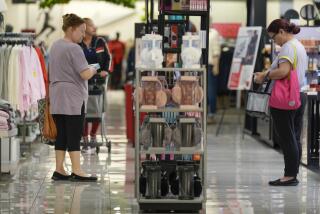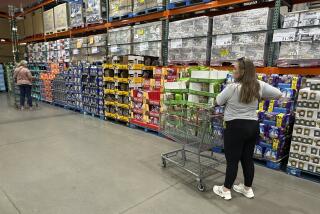Retail relapse casts doubt on recovery
Retail sales in the U.S. unexpectedly dropped in March for the first time in three months, raising concern the biggest part of the economy may falter again heading into the second quarter.
Purchases fell 1.1%, with declines affecting almost every sector, including car dealers, electronics stores and restaurants, the Commerce Department said Tuesday. Only pharmacies and grocery stores saw a gain. Separately, the Labor Department said wholesale prices fell, indicating that deflation risks remain.
The reports served to temper optimism that the recession had passed its worst phase and pushed down shares of retailers including Home Depot Inc. and Macy’s Inc.
“The job losses are too great for the consumer to spring back strongly,” said Chris Rupkey, chief financial economist at Bank of Tokyo-Mitsubishi UFJ Ltd. in New York. “Today’s data is a stark reminder that we haven’t yet seen the bottom in this recession.”
Stocks slid, with the Standard & Poor’s Retailing Index closing down 2.5% at 307.08 in New York, and the broader S&P; 500 index down 2% at 841.50. Benchmark 10-year Treasuries gained, sending their yields down.
Retail sales had been projected to rise 0.3% in March after an originally reported 0.1% decline the prior month, according to the median estimate of 73 economists in a Bloomberg News survey.
The results indicate that incentives and promotions by car dealers and clothing stores such as Gap Inc. failed to draw customers hurt by a lack of credit and the highest unemployment rate in more than 25 years.
“The green shoots are looking a little brown,” said Ethan Harris, co-head of U.S. economic research at Barclays Capital Inc. in New York, referring to remarks by Federal Reserve Chairman Ben S. Bernanke last month that “green shoots” of recovery had begun to appear.
“The hope is that continued policy stimulus will offset the other bad news and give us some kind of growth” in sales in the second quarter, Harris said.
Excluding automobiles, retail sales decreased 0.9% after a 1% gain in February. They were forecast to show no change, according to the Bloomberg survey.
In addition to rising unemployment, a late Easter holiday this year may have shifted sales out of March and into April, some economists said. Movable holidays can make it more difficult for government surveys to take into account seasonal buying patterns when tabulating purchases.
Wholesale prices fell 1.2% in March after a 0.1% gain in February, the report from Labor showed. Excluding fuel and food, so-called core prices were unchanged. Over the last 12 months, wholesale expenses fell by the most in almost six decades.
“Clearly, deflation is a concern right now, though the biggest worry is to restore growth,” said Anika Khan, an economist at Wachovia Corp. in Charlotte, N.C. As long as inflation remains contained, Khan said, “it gives the Fed more room to try to restore growth.”
More to Read
Inside the business of entertainment
The Wide Shot brings you news, analysis and insights on everything from streaming wars to production — and what it all means for the future.
You may occasionally receive promotional content from the Los Angeles Times.









